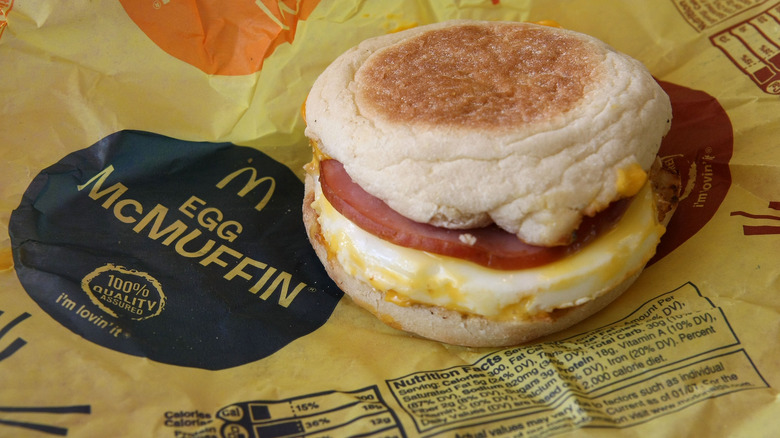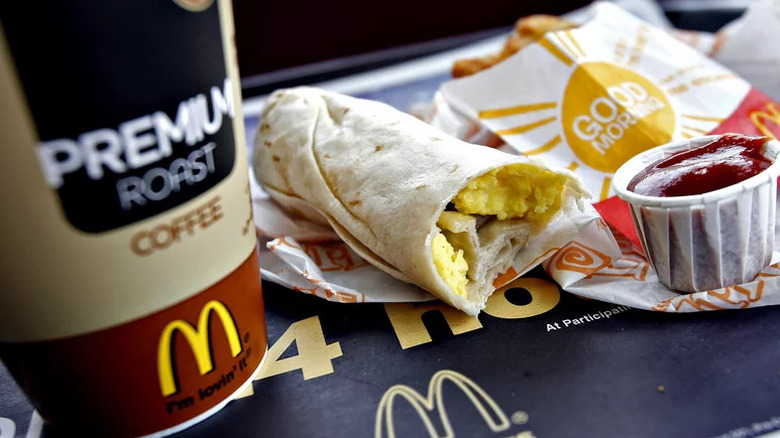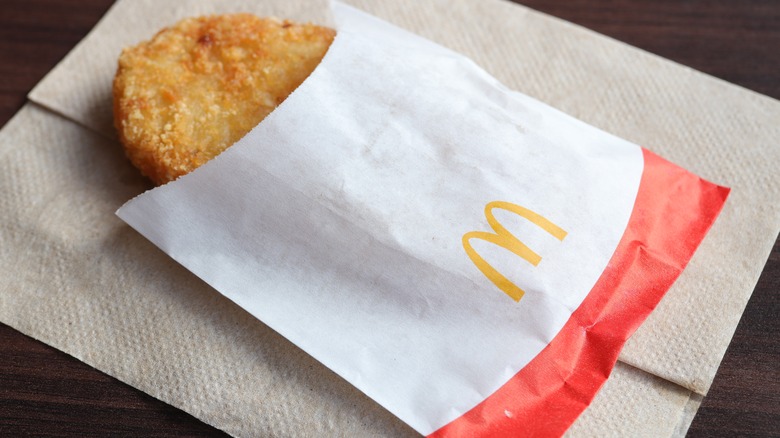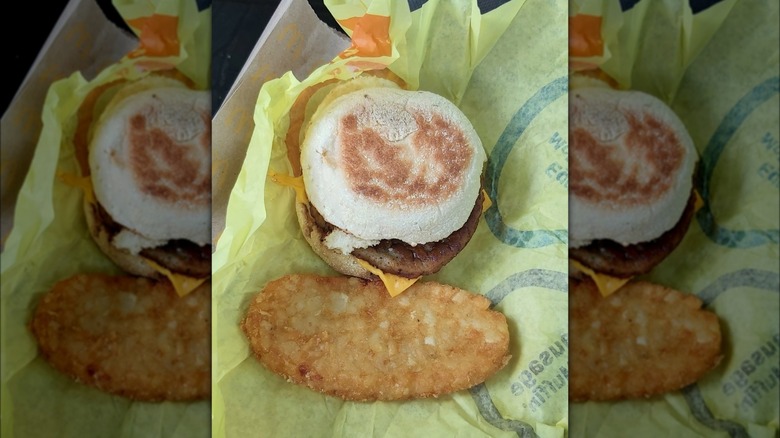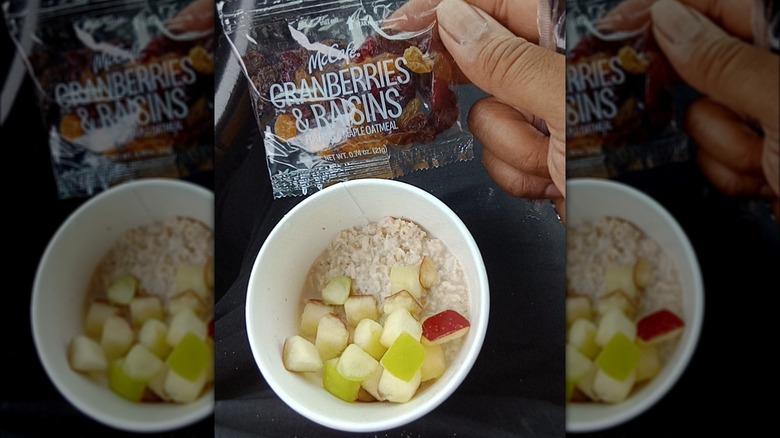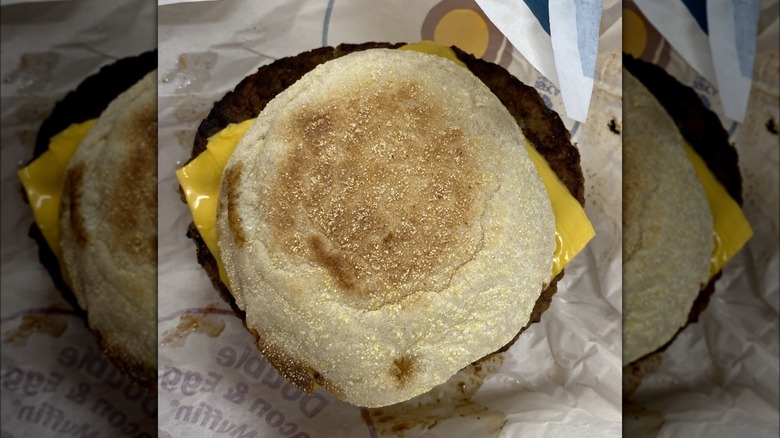The Healthiest McDonald's Breakfast Items Might Surprise You
There are plenty of words to describe McDonald's, but "healthy" usually isn't one of them. Since the fast food chain's first restaurant opened in San Bernadino in 1940, it's gained a reputation for quick, convenient, and tasty meals that do a stellar job of satiating cravings for carbohydrates — even if they do a not-so-impressive job in terms of nutrition.
Its breakfast menu is no exception. Although nothing hits the spot quite like a greasy, cheesy McGriddle (and it'll take a lot more than some negative nutritional information to put us off ordering one forever), the reality is that, just like the burgers, fries, and nuggets, a significant number of McDonald's breakfast items are packed with high amounts of saturated fat, sodium, or added sugar.
The good news is that some of these menu items are less alarming on the health front than others. While we're hesitant to declare that anything on the McDonald's breakfast menu is healthy per se, it does contain a few options with a relatively strong nutritional profile. Make your next early morning trip to the Golden Arches slightly healthier by ordering one of these six breakfast menu items.
Egg McMuffin
We would go as far as to say that the Egg McMuffin is the quintessential McDonald's breakfast menu item. First invented by Herb Peterson in 1972, the goal was to create an homage to eggs benedict by slapping together melted cheese, a thin slice of lean Canadian bacon, and a Grade A egg — cooked in a metal ring to create the iconic, uniform circle shape — between two slices of an English muffin.
Needless to say, Peterson created a masterpiece — one so successful that McDonald's rivals have been trying to match its success ever since. Good job, Herb. However, he didn't just succeed on the flavor front; Peterson also formulated one of the restaurant's most nutritionally sound menu items. Each Egg McMuffin contains an impressive 17 grams of protein and 13 grams of fat, 6 grams of which are saturated. The protein content is the standout detail to us, helping to keep you feeling full throughout the morning.
An Egg McMuffin also provides a respectable 310 calories and 15% of your daily recommended calcium intake. We're a big fan of eating anything containing eggs for breakfast, thanks to their high concentration of vitamins (especially vitamin B and selenium), and their positive impact on cholesterol. While plenty of McDonald's breakfast items contain eggs, the McMuffins are the only ones using cracked eggs, earning it another bonus point in our eyes. Unsurprisingly, we named it one of the best McDonald's menu items of all time.
Sausage Burrito
"Sausage," "burrito," and "healthy" rarely go hand in hand, but what is life without a few surprises? McDonald's Sausage Burrito piles on the scrambled egg, pork sausage, cheese, green chiles, and onions, and wraps them in a soft flour tortilla to provide a relatively balanced meal well worth picking up on your morning commute (or, more realistically, ordering via DoorDash after a late night).
Protein is the Sausage Burrito's biggest selling point. Thanks to the combo of eggs and sausage, each burrito contains 13 grams of filling protein. The calorie count is also surprisingly low at 310 calories per burrito. It also doesn't hurt that the Sausage Burrito is the only McDonald's breakfast menu item to contain actual vegetables. While it may not be overflowing with chiles and onion, some degree of veggies is better than nothing, and there are enough chiles in there to give each burrito a bit of a kick. The only thing that lets it down slightly is its 800 milligrams of sodium, so you may want to watch your salt intake for the rest of the day post-burrito.
Hash Browns
Technically, the McDonald's Hash Browns are intended as a side, but we'd be lying if we said we've never ordered one (or two) as a light breakfast. They've been a staple on the McDonald's national breakfast menu since its inception in the 1970s (when it marketed them as "a great taste in a funny shape"), and for good reason. Each patty is composed of shredded potato, fried to perfection so they're crispy on the outside, fluffy on the inside, and just generally a tiny slice of breakfast joy.
Thanks in part to their relatively small size, each Hash Brown contains just 140 calories and 1 gram of saturated fat. You'll also get 2 grams of protein and 2 grams of dietary fiber, as well as zero added sugar. While this isn't really enough to stand alone as a nutritious meal, it does make a valuable addition to one of the more protein-heavy items on the breakfast menu. If you're feeling extra adventurous, you can even request for your Hash Brown to be squeezed into your McMuffin. Alternatively, if you're struck by a craving out of breakfast hours (RIP all-day breakfast), you can have a go at whipping up your own copycat McDonald's Hash Browns at home.
Sausage Egg McMuffin
Just when you thought the Egg McMuffin couldn't be topped, McDonald's swapped out the Canadian bacon and added a round pork patty to create the Sausage Egg McMuffin. Like its sausage-free counterpart, this menu item comes with the usual nutritional perks of morning eggs plus an upgraded dose of protein at 20 grams per McMuffin.
The combination of egg and meat also works wonders for the iron content. Each Sausage Egg McMuffin also contains 3 milligrams of iron. Iron plays a huge role in supporting your immune system, boosting your memory, and keeping fatigue at bay, but it can also be tricky to nail 100% of your recommended intake. So, it's always handy to find things like the Sausage Egg McMuffin, which will get you 20% of the way to your goal.
Extra calories is the price you pay for this extra protein and iron. McDonald's Sausage Egg McMuffin contains 480 calories, 170 more than the Egg McMuffin. It's also heavier in sodium at 830 milligrams and contains 12 grams of saturated fat. If you're willing to plan the rest of your day around these values, the Sausage Egg McMuffin can still make for a decent morning meal — especially if you're someone who prefers a hearty, filling breakfast. If you're determined to improve its nutritional profile, you can request your McMuffin without the American cheese, which will remove 210 milligrams of sodium and 2 grams of saturated fat.
Fruit & Maple Oatmeal
Oatmeal is generally a strong breakfast choice thanks to the high concentration of fiber and antioxidants, low concentration of cholesterol, and oats' natural ability to stabilize blood sugar levels. What typically drags down oatmeal's health benefits is all the stuff we tend to add to our bowl, such as syrups, dried fruits, or chocolate chips.
That's the case for McDonald's Fruit & Maple Oatmeal, which sends its sugar levels soaring with the inclusion of brown sugar (despite the name, you won't find any mention of "maple" in the entire ingredients list). Overlooking the sugar content for a moment, its nutritional profile is otherwise pretty strong. Each bowl contains 4 grams of fiber, which can help regulate your sugar, as well as 6 grams of protein. It's also far lower in sodium than most of the McDonald's breakfast menu at just 150 milligrams, plus it contains just 320 calories.
Like the veggies in the Sausage Burrito, the portion of fruit atop your oatmeal isn't sizable enough to massively contribute to your daily intake. However, again, even a small amount of diced apples, cranberries, and raisins is better than nothing. We'd recommend just keeping an eye on the amount of added sugar you consume through snacks and other meals throughout the day to counterbalance the 18 grams found in this oatmeal. You can also forgo the cranberries and raisins to bring down the sugar levels. As an added note, this is one of the few vegan items at McDonald's.
Sausage McMuffin
In case it wasn't obvious, we're huge fans of McDonald's McMuffins for a healthy-ish breakfast treat. The Sausage McMuffin is exactly what it sounds like, stripping away the eggs from the Sausage Egg McMuffin to give you a straightforward combination of pork sausage, cheese, and the usual sliced English muffin.
By removing the eggs, you do lose some of the nutritional perks. A Sausage McMuffin contains 14 grams of protein, which is 6 grams less than the Sausage Egg McMuffin's impressive 20 grams total, and may mean you feel slightly less full after eating. The silver lining, however, is that the Sausage McMuffin is lower in calories (400 calories) and sodium (760 milligrams). It's also still strong in iron with 2.5 milligrams per McMuffin, which equals 15% of your daily recommended values.
Again, you can further improve the nutritional profile of this McMuffin by skipping the cheese. If you want to trim down the numbers even further, it's also an option to request the McMuffin without the salted butter, which will remove 1 gram of saturated fat. Removing both the cheese and butter will get you a Sausage McMuffin that contains a respectable total of 330 calories. Not too shabby for a filling fast food breakfast.

